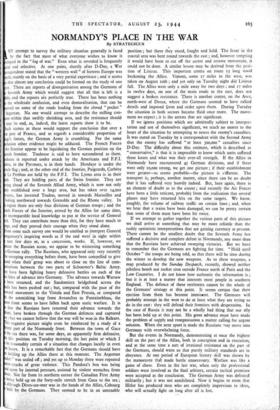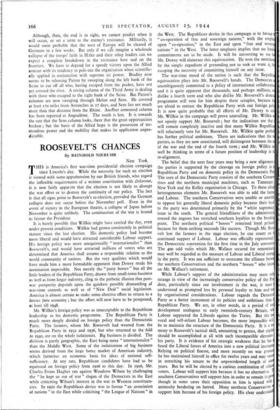NORMANDY'S PLACE IN THE WAR
By STRATEGICUS
NY attempt to survey the military situation generally is faced by the fact that most of what everyone wishes to know is veloped in the "fog of war." Even what is revealed is frequently rust and selective. At one point, shortly after D-Day, a War trrespondent stated that the "western wall" of fortress Europe was nyth, mainly on the basis of a very partial experience ; and it seems ae that almost any conclusion coulA be formed on the study of one tor. There are reports of disorganisation among the Germans of e Seventh Army which would suggest that all that is left is a bble, and the reports ai-e perfectly true. There has been nothing e the wholesale confusion, and even demoralisation, that can be served on some of the roads leading from the closed " pocket " Argentan. No one would attempt to describe the milling con- ion within that swiftly shrinking area, and the resistance should near its end, as, indeed, the latest reports show it to be.
Such scenes as these would support the conclusion that over a eat part of France, and as regards a considerable proportion of uge's forces, the German Army is crumbling. For the same nchision other evidence might be adduced. The French Forces the Interior appear to be liquidating the German position on the anish frontier. Toulouse is said to have surrendered to them. rdeaux is reported under attack by the Americans and F.F.I. rbes, in the Pyrenees, is in their hands. Hendaye is under the each flag ; and, at the other end of the frontier, Puigcerda, Cerbere I Le Perthus are held by the F.F.I. The Lyons area is in their ds. They are holding parts of the Swiss frontier. They are ring ahead of the Seventh Allied Army, which is now not only tnly established over a large area, but has taken over 14,000 soners, has invested Toulon, moved in towards Marseilles and looking northward towards Grenoble and the Rhone valley. In s region there are only four divisions of German troops ; and the each Forces of the Interior, armed by the Allies for some time, T incomparable local knowledge to put at the service of General ch. They can contribute more than this, for they have much to nge, and they proved their courage when they stood alone.
rom some such survey one would be entitled to interpret General ontgomery's inspiring words as if the end were in sight within next few days or, as a concession, weeks. If, however, we nine the Russian scene, we appear to be witnessing something a German rally. The Russians, who appeared only very recently be sweeping everything before them, have been compelled to give and when their. grasp was about to close on the line of corn- nications between the two parts of Schoerner's Baltic Army. ey have been fighting heavy defensive battles on each of the an lines of advance into Germany. The advance towards Warsaw been resumed, and the Sandomierz bridgehead across the tula has been pushed out ; but, compared with the pace of the stward movement to the Vistula and East Prussia, or compared the astonishing leap from Avranches to Fontainebleau, the tern front seems to have fallen back upon static warfare. It is e that the Russians have resumed their advance towards the tkans, have broken through the German defences and captured ■ sY ; but we cannot believe that the war will be won in the Balkans. Ibis negative picture might even be reinforced by a study of a erent part of the Normandy front. Between the town of Gace the sea there was, for some days, an apparently firm defensive. ke this position on Tuesday morning, the last point at' which I be reasonably certain of a situation that changes locally in even cw hours. It is a remarkable fact that the Germans should have .41 holding up the Allies there at this moment. The Argentan locket " was sealed off ; and yet up to Monday there were repeated inter-attacks of great violence. This Pandora's box was being red open by internal pressure, assisted by violent wrenches from iiwt. Not far from its northern corner the Canadian First Army , being held up on the forty-mile stretch from Gace to the sea ; ; although Dives-sur-mer was in the hands of the Allies, Cabourg held by the Germans. They seemed to be in an untenable
position ; but there they stood, fought and held. The front in the coastal area was bent round towards the east ; and, however tempting it would have been to cut off the sector and restore movement, it could not be done. A similar lesson may be derived from the posi- tion of Lisieux. This important centre on route 13 long stood beckoning the Allies. Vimont, some 17 miles to the west, was taken on August loth; and yet only on Tuesday night did Lisieux fall. The Allies were only a mile away for two days ; and 17 miles in twelve days, on one of the main roads to the east, does not suggest a. broken resistance. There is another centre, on the Avre, north-west of Dreux, where the Germans seemed to have rallied details and imposed torm and order upon them. During Tuesday the situation in both sectors became fluid once more. The move- ment we expect ; it is the arrests that are significant.
If we ignore positions which are admittedly subject to interpre- tation and not of themselves significant, we reach no nearer to the heart of the situation by attempting to assess the enemy's casualties.
It was stated on Tuesday by a correspondent with the Second Army that the enemy has suffered "at least 300,000 " casualties since D-Day. The difficulty about this estimate, which is described as "conservative," is that it is impossible to know which units suffered these losses and what was their over-all strength. If the Allies in Normandy have encountered 45 German divisions, and if these were only ro,000 strong, we get one picture ; if their establishment were greater—as seems probable—the picture is oifferent. The transport is, perhaps, another matter, since there can be no doubt
that it has suffered very heavily indeed. But, here again, there is an element of doubt as to the extent ; and recently the Air Forces
have been a little reticent, probably from the realisation that several planes may have returned hits on the same targets. We know, roughly, the volume of railway traffic on certain lines ; and, when we hear that x trains have been damaged, we can be pretty certain that some of them must have been hit twice.
If we attempt to gather together the various parts of this picture we shall arrive at something that may be more reliable than the rashly optimistic interpretations that are gaining currency at present.
There cannot be the smallest doubt that the Seventh Army has suffered a decisive and complete defeat in Normandy, any more than
that the Russians have achieved sweeping victories. But we have to remember that the Germans are fighting for time. "Hold until October" the troops are being told, so that there will be time during the winter to develop the new weapons. As to these weapons, a map produced by the Sunday Despatch, recently, showed neither pilotless bomb nor rocket sites outside France north of Paris and the Low Countries. I do not know how authentic the information is ; but it is at least a matter that interests most people in southern England. The defence of these territories cannot be the whole of the Germans' strategy at this point. It seems certain that their ejection from them has become imminent. The Germans will probably attempt in the west to do at least what they are trying to
do in the east: they will defend their frontiers with desperation. In the case of .Russia it may not be a wholly bad thing that our ally has been held up at this point. His great advance must have made
the problem of supply and reorganisation a matter calling for urgent solution. When the next spurt is made the Russians -nay move into Germany with overwhelming force.
But the events in Normandy, demonstrating at once the highest skill on the part of the Allies, both in conception and in execution, and at the same time a sort of irrational resistance on the part of the Germans, should warn us that purely military standards are in abeyance. At one period of European history skill was shown by the manoeuvre that made battle unnecessary. Warfare was like a game of chess. Even in the last war, when only the professional soldiers were involved as the final arbiters, certain tactical premises were accepted as the conclusion. The German Army was defeated militarily ; but it was not annihilated. Now it begins to seem that Hitler has produced men who are completely impervious to ideas, who will actually fight on long after all is lost.
Although, then, the end is in sight, we cannot predict when it will occur, or set a term to the enemy's resistance. Militarily, it would seem probable that the west of Europe will be cleared of Germans in a few weeks. But only if we call imagine a wholesale collapse of the troops' faith in Hitler and their °the/ leaders can we expect a complete breakdown in the resistance here and on the frontiers. We have to depend for a speedy victory upon the Allied armour with its tendency to pole-axe the organisation when scientific- ally applied in conjunction with supreme air power. Bradley now seems to be releasing Patton by sweeping along the left bank of the Seine to cut off all who, having escaped from the pocket, have not yet crossed the river. A roving column of the Third Army is dealing with those who escaped to the right bank of the Seine. But Patton's columns are now sweeping through Melun and Sens. He covered at least 170 miles from Avranches in 17 days, and Sens lies not much more than that distance from the Rhine. Another armoured column has been reported at Angouleme. The south is lost. It is towards the east that the Sens column looks, there that the great opportunities beckon ; but the basis of the Allied hope is the possession of tre- mendous power and the mobility that makes its application unpre- dictable.



























 Previous page
Previous page